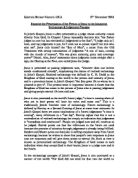Jesus is also presented as the world’s future judge, “a time is coming when all who are in their graves will hear his voice and come out.” This is a traditionally Jewish futuristic view of eschatology. Future eschatology is defined by Barclay as a Second Coming of Jesus at some time unknown. In John’s Gospel there are some implications of a future judgement: “a time is coming”, many references to a “last day”. Barclay argues that this is not a contradiction of realised eschatology but simply an indication that judgement is “immediate and continuous”. People are judged now and will continue to be judged. Barrett points out that the references to the future are used because the promise of salvation through judgement is already being fulfilled. Sanders and Mastin point out that John is shifting emphasis away from future eschatology because he wishes to show that people’s own responses to Jesus now are important and will give them access to eternal life. Such as view is known as personalised eschatology. The Kingdom of God comes to each individual when they accept God in their hearts. Jesus is a judge now and in the future.
In the eschatology passages of John’s Gospel, Jesus is also portrayed as a saviour of the world: “For God did not send his Son into the world to condemn the world, but to save the world through him”. This does not conflict with Jesus’ authority to pass judgment. Dodd points out that judgment is an inevitable consequence of Jesus’ work for the salvation of people. Some people will reject Jesus’ offer of salvation and will stand “condemned already because he has not believed in the name of God’s one and only son”, whereas others who accept Jesus will have “everlasting life”. Otto refers to Jesus as the eschatological saviour. Jesus’ salvation of people leads to judgment: “just as the Father raises the dead and gives them life, even so the Son gives life to whom he is pleased to give it.
As with Jesus’ judgement, his salvation is both now and in the future. “Those who have done good will rise to live” clearly implies that salvation takes place in the future while the present tense in “whoever believes in him is not condemned” implies that salvation has been achieved now. The two are not mutually exclusive, Hunter regards salvation as a present process. It is something available now and something that continues to be available.
John also portrays Jesus as being divine. In the eschatology and judgment passages in his Gospel there are many references Jesus divinity and his relationship with God. Jesus is called the “Son of God” implying and intimate relationship between Jesus and God. Jesus repeatedly calls God “my Father”, “the Father”. God has “entrusted all judgment” in Jesus, has granted Jesus to “have life in himself”. Jesus authority comes directly from God because he has “come down from heaven”. This is an important aspect of John’s Christology as it links back to themes in the prologue “the Word was with God, and the Word was God”.
The “I am” formula in the discourses “I am the bread of life” and “I am the resurrection and the life” also link Jesus to God as it is the language of the divine. It is the formula God frequently uses in the Old Testament: “I am who I am” Exodus. Yahweh, the Jewish name for God, literally means “he is”. In John’s Gospel, Jesus is using “the divine word of self revelation”, Barrett, to highlight his divine authority.
In his Gospel, John is concerned with highlighting the significance of the person of Jesus and his impact upon humanity. He presents Jesus as the world’s judge and saviour, both present and in the future, with power and authority from God. Because of Jesus’ importance, John places great importance on the individual’s response to Jesus for it is upon that response that people are judged and saved with the gift of eternal life.







